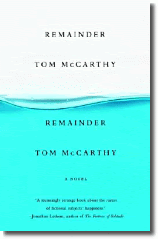 Liesl Schillinger wrote that Tom McCarthy's "bleak humor, hauntingly affectless narrator and methodical expansion on his theme make Remainder more than an entertaining brain-teaser: it’s a work of novelistic philosophy, as disturbing as it is funny."
Liesl Schillinger wrote that Tom McCarthy's "bleak humor, hauntingly affectless narrator and methodical expansion on his theme make Remainder more than an entertaining brain-teaser: it’s a work of novelistic philosophy, as disturbing as it is funny."And that rave review in the Sunday New York Times is no anomaly: Tod Goldberg, in his Los Angeles Times review, called Remainder "a book to be read and then reread, rich as it is with its insights, daring as it is with its contradictions."
Jonathan Lethem, author of The Fortress of Solitude, said of Remainder: “A stunningly strange book about the rarest of fictional subjects, happiness.”
What is Remainder about? From the publisher:
A man is severely injured in a mysterious accident, receives an outrageous sum in legal compensation, and has no idea what to do with it.Read other reviews of Remainder, an excerpt, and see how well it was served by the Page 69 Test.
Then, one night, an ordinary sight sets off a series of bizarre visions he can’t quite place.
How he goes about bringing his visions to life – and what happens afterward – makes for one of the most riveting, complex, and unusual novels in recent memory.
Remainder is about the secret world each of us harbors within, and what might happen if we were granted the power to make it real.
One snippet from McCarthy's Q & A at his American publisher's site:
Q. REMAINDER has been called “the best French novel ever written in English by an Englishman.” How do you think American readers might respond differently to the book?For more about Remainder and the essays and criticism of Tom McCarthy, visit Surplus Matter.
A. Twentieth century French and American literature are not so far apart: both took part in the great adventure of Modernism, while England looked on from the sidelines. Eliot, for example, spent part of his early career writing in French; Burroughs, a little later, was completely immersed in the Paris scene, and so on. Remainder owes a lot to French writers, but also to American ones: landscapes of trauma and repetition are as much a part of Faulkner’s work (in Absalom! Absalom! for example) or Pynchon’s (in Gravity’s Rainbow) as they are of Claude Simon’s or Alain Robbe-Grillet’s. And it seems to me that the whole question of ‘authenticity’, which is central to Remainder, is a pertinent one for contemporary experience in America. America is where Baudrillard finds most of his examples of the ‘hyperreal’, after all . . .
--Marshal Zeringue





